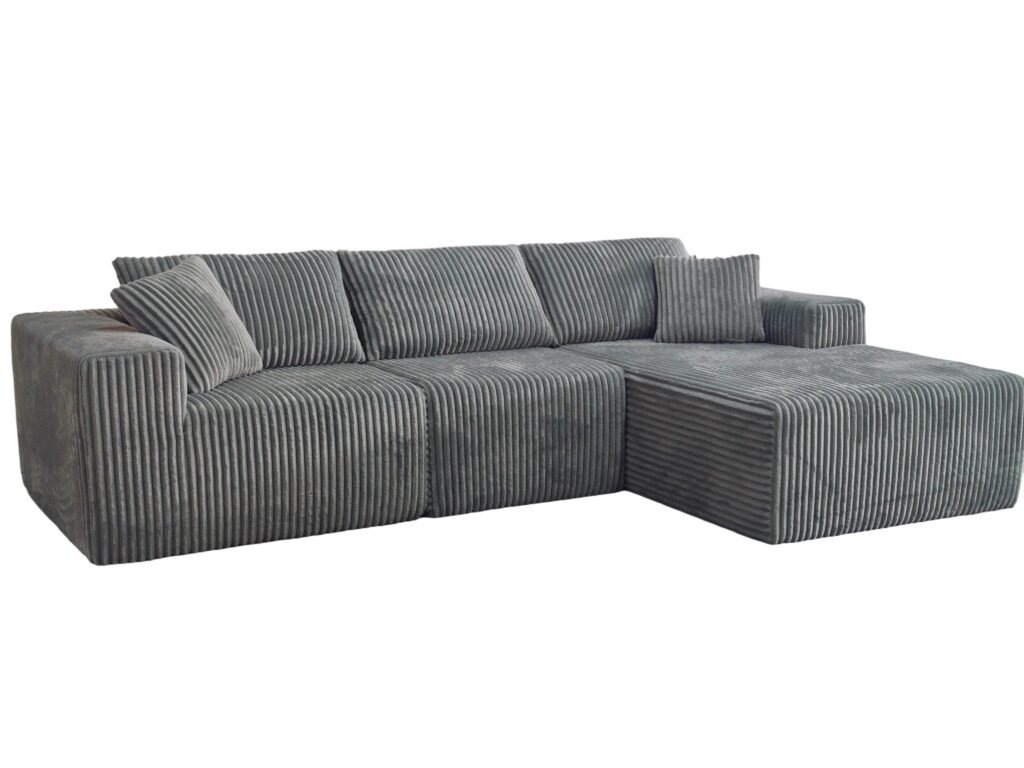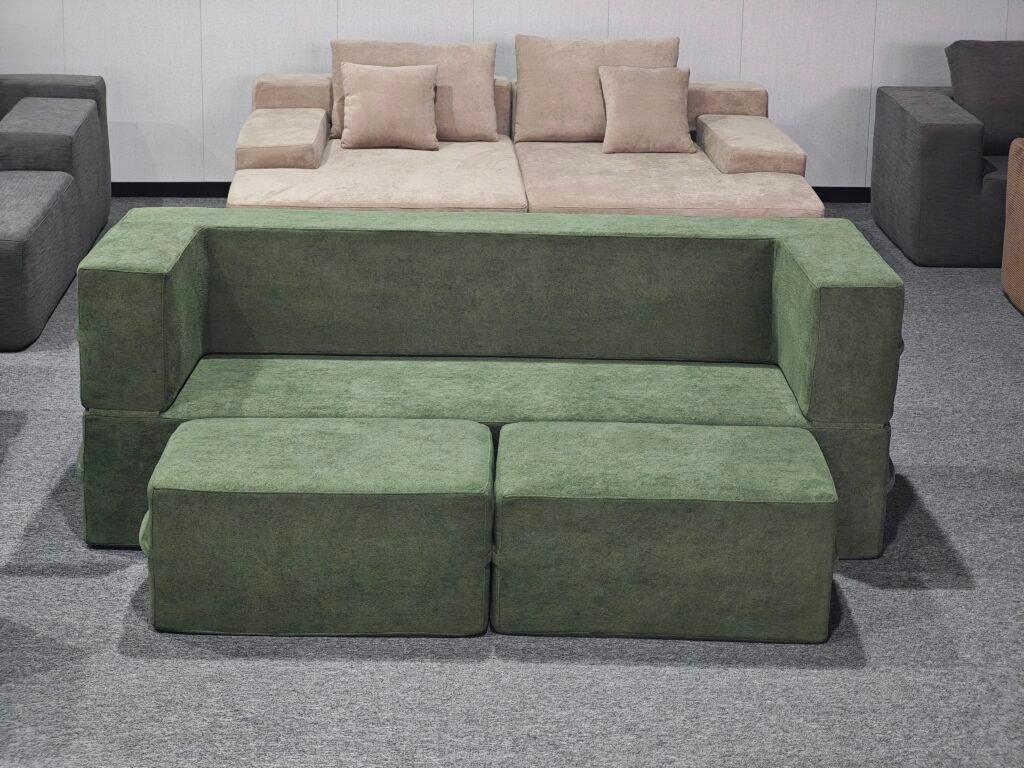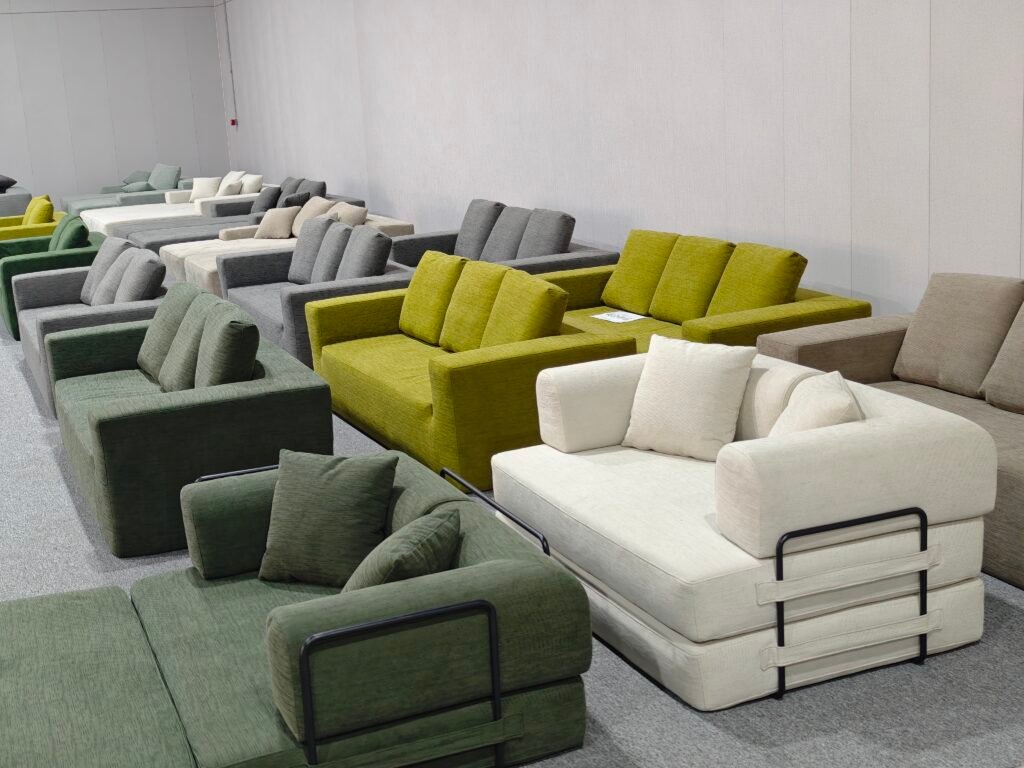The growing appeal of compressed sofas in global furniture markets stems from their innovative design and efficient logistics. Significantly reducing shipping volumes by up to 65%, these products represent a convergence of material science, manufacturing technology, and supply chain innovation. However, the ability to compress a fully assembled sofa into a compact package and still deliver lasting comfort, durability, and safety requires meticulous quality control throughout the production cycle.
Compressed sofa factories like modular-sofas.com have become exemplars in maintaining rigorous quality standards, blending modern industrial techniques with sustainability goals and customer-centric processes. A systematic quality control (QC) framework is fundamental to ensure that each sofa not only withstands mechanical compression but also meets aesthetic and functional expectations at every touchpoint—from raw materials to final unpacking.


The Vital Role of Quality Control in Compressed Sofa Manufacturing
Quality control in the context of compressed sofa manufacturing assumes a multidimensional role. Unlike traditional sofas, compressed sofas endure mechanical stresses from aggressive compression and rapid rebound while enclosed within vacuum-sealed packaging. This introduces specific challenges such as material fatigue, distortion, or surface defects that must be prevented through robust and proactive quality assurance practices.
Effective QC protects brand reputation by minimizing defective outputs, reducing costs incurred through rework or returns, and meeting increasingly strict international safety, environmental, and consumer compliance regulations. Also, given the rising trend of direct-to-consumer e-commerce and dropshipping in the furniture sector, quality consistency becomes even more critical as end users expect faultless products that arrive ready to expand and use.
Successful compressed sofa factories integrate QC from the earliest design decisions through to final shipment documentation, ensuring traceability, transparency, and continuous improvement.
Raw Material Inspection and Verification
The cornerstone of quality assurance begins with a comprehensive inspection of all incoming raw materials. Each batch of critical components—such as foam, upholstery textiles, frames, and springs—is subjected to stringent testing criteria. These include verifying certifications like CertiPUR-US for foam safety and sustainability and Oeko-Tex 100 for fabric health standards. Verification of supplier documentation and quality assurances complements in-factory inspections to establish trustworthiness and consistency.
Physical inspection involves measuring critical parameters. Foam blocks are tested for density, indentation force deflection, and resilience to ensure they can endure thousands of compression cycles. Frame materials are checked for moisture content, absence of warping, splits, or decay. Upholstery fabrics are sampled for tensile strength, pilling resistance, colorfastness, and texture uniformity to detect irregularities before use.
By conducting supplier audits and maintaining approved vendor lists, factories like modular-sofas.com ensure materials meet high quality and ethical standards consistently.
Monitoring In-Process Quality During Assembly
During the sofa’s assembly phase, ongoing in-process quality control is essential to prevent cumulative defects and guarantee adherence to design specifications. Early detection of issues reduces scrap and minimizes costly post-production fixes.
Frame assembly is closely controlled through manual inspections and digital measurement tools. Joints, screw placement, and bonding are verified for strength and durability. The incorporation of pocket springs requires precise positioning and secure fastening to prevent shifting, noise, or damage during use and compression. Similarly, the foam application process includes verification of the cutting accuracy and layering to meet ergonomic comfort targets.
Upholstery sewing undergoes continuous scrutiny to assess seam strength, stitch density, and finish. Particularly for modular sofas or those with removable covers, zippers and fasteners must be tested to ensure smooth operation without fabric damage.
Random dimensional audits ascertain that ongoing production stays within tight tolerances, preserving consistency across batches. Automated alert systems and quality dashboards often assist operators in identifying trends or deviations in real-time.


Specialized Quality Follow-Through in Compression and Vacuum Packaging
The defining manufacturing stage of compressed sofas—mechanical compression and vacuum packing—demands its own set of dedicated QC protocols beyond traditional furniture production controls.
After final sofa assembly, sofas pass through multi-step compression and sealing procedures where volume may decrease by around 65%. Testing involves measuring accurate compression ratios to prevent over-compression that could damage materials or under-compression that decreases packing efficiency.
Vacuum seal integrity is rigorously checked to maintain airtightness that thwarts moisture, mold, and air leakage during international shipping. Leak detection technologies identify packaging failures before logistics dispatch. Visual surface inspections ensure upholstery remains crease- and blemish-free despite intense packing stresses. Compression cycle endurance tests — sometimes simulating over 5000 cycles — validate resilience and durability, ensuring sofas maintain form across repeated compress-and-expand processes.
Packaging materials are also weighed against sustainability criteria, favoring recyclable vacuum films and sturdy corrugated cartons designed for multiple stacking cycles during transit.
Final Product Audits and Compliance Verification
Before leaving the factory, each compressed sofa undergoes thorough final inspections. Visual checks focus on upholstery finish quality, stitching integrity, material uniformity, and absence of cosmetic defects. Functionality tests verify assembly fittings, modular connectors, and any mechanical features operate flawlessly.
Dimensional verification ensures packaged sofas conform to shipping standards, enabling packaging optimization and regulatory adherence. Factories cross-check product documentation, confirming all certifications—ISO 9001 for quality management, CertiPUR-US for foam safety, applicable EN or ASTM furniture standards, and local fire-retardancy requirements—are up to date.
When fulfilling custom OEM or ODM orders, extensive sample inspections and client approvals guarantee product-buyer alignment. Documentation is finalized including inspection reports, batch codes, and shipping manifests, creating end-to-end product traceability.
Essential Quality Control Testing Protocols
Quality control is reinforced through a suite of physical and chemical testing methods, each chosen to address the specific stresses compressed sofas encounter.
Compression testing quantitatively evaluates foam rebound and durability under cyclical loading, preventing material breakdown or sagging. Tensile strength and abrasion resistance tests on upholstery fabrics prevent premature tears or wear in daily use.
Spring systems are tested for load capacity, noise emissions, and dimensional stability post-compression. Specialized fire retardancy assessments are conducted especially for commercial-grade sofas destined for hotels or public venues.
Packaging integrity undergoes moisture vapor transmission, tensile strength, and accelerated aging tests to simulate shipment exposures and ensure product protection.
QC teams blend automated instrumentation with manual sensory checks, creating a multilayered inspection net that captures even subtle defects.
Comprehensive Documentation and Traceability Systems
Maintaining detailed and accessible records is vital for QC success in complex supply chains. Factories implement digital Quality Management Systems (QMS) capable of consolidating QC data, production logs, audit trails, and test results.
Each sofa unit is linked to batch numbers of raw materials and fabrication runs, enabling swift problem tracing and corrective action if issues arise downstream. Nonconformance reports categorize defects, monitor recurrence, and guide continuous improvement efforts.
The ability to verify compliance for each unit supports efficient client communication, warranty processing, and regulatory audits globally. It builds trust by fostering transparency and accountability—a hallmark of industry leaders like modular-sofas.com.
Cultivating a Quality-First Culture through Employee Training
Quality control is not solely technological but profoundly reliant on human expertise and commitment. Investment in continuous workforce education ensures inspection precision, process discipline, and proactive problem-solving.
Training programs cover quality standards, defect identification, safety compliance, and use of testing equipment. Empowering employees to take ownership of product quality promotes a culture where defect prevention is prioritized over defect correction.
Cross-departmental collaboration between design, production, and QC teams enhances feedback mechanisms and innovation. Recognitions and incentives for quality performance motivate sustained excellence.
Leadership commitment at modular-sofas.com exemplifies how employee engagement underpins their consistent product superiority.
Auditing, Metrics, and Continuous Quality Improvements
Systematic internal and third-party audits provide objective assessments of the QC system’s robustness. These evaluations analyze adherence to documented procedures, effectiveness of corrective actions, and alignment with evolving standards.
Implementation of continuous improvement methodologies like Lean Manufacturing and Six Sigma programs drives refinement of operational processes. Defect Pareto analyses, root cause investigations, and process capability studies underpin measured reductions in failure rates and improved manufacturing yields.
Utilizing real-time data analytics and predictive quality indicators equips management with actionable insights to anticipate and mitigate risks proactively. This proactive stance is critical in maintaining competitive advantage in fast-evolving compressed sofa markets.


Integration of Sustainability in Quality Control Practices
Sustainability has grown into a core dimension of quality management. Leading compressed sofa factories weave ecological consciousness into QC by setting targets for eco-friendly materials, waste reduction, and packaging innovations.
Certification adherence ensures raw materials meet environmental and health standards. Factories strive to minimize plastic use in vacuum films, optimize packaging to reduce biomass waste, and pioneer reusable materials where feasible.
Environmental KPIs are monitored alongside traditional QC metrics, reflecting a balanced approach that satisfies stakeholders seeking socially responsible manufacturing practices. Modular-sofas.com documents these sustainability efforts transparently, reinforcing brand value.
Managing and Mitigating Quality Risks in Production
Every manufacturing process faces risks. In compressed sofa production, common quality failure modes include raw material inconsistencies, damage during compression, assembly errors, or packaging defects.
Risk mitigation focuses heavily on supplier qualification, process automation, real-time monitoring, and robust training. Quality gates are strategically positioned, and deviations trigger immediate investigations and containment.
A culture supporting root cause analysis avoids superficial fixes and cultivates systemic corrections—a crucial factor in safeguarding product integrity and customer satisfaction.
Summary Table: Key Quality Control Areas in Compressed Sofa Manufacturing
| Quality Control Aspect | Best Practices | Tools and Techniques | Outcome Focus |
|---|---|---|---|
| Raw Material Verification | Supplier certification checks, incoming physical & mechanical tests | Lab testing, visual inspections | Defect-free component intake |
| In-Process Quality Monitoring | Continuous frame, foam, spring, and upholstery inspections | Measurement gauges, compression testers | Assembly accuracy and consistency |
| Compression & Packaging QC | Compression ratio measurement, vacuum seal leakage tests, cycle testing | Hydraulic presses, leak detectors | Packaging efficiency and durability |
| Final Inspection & Testing | Visual quality checks, dimensional verification, certification audits | QA checklists, dimensional tools | Market-ready product assurance |
| Documentation & Traceability | Digital QC records, batch codes, non-conformance tracking | Quality Management Systems | Complete transparency & claims support |
| Employee Training & Culture | Continuous education, quality ownership empowerment | Workshops, e-learning modules | Skillful and proactive workforce |
| Continuous Improvement & Audits | Internal/third-party audits, Lean/Six Sigma application | Data analytics, audit reports | Defect reduction & process optimization |
| Sustainability Integration | Eco-friendly materials, recyclable packaging, environmental KPIs | Certification audits, lifecycle assessments | Responsible production |
| Risk Management | Supplier vetting, real-time QC alerts, root cause analyses | Incident tracking, process control charts | Quality stability and avoidance |
Final Thoughts
Quality control is the lifeblood of compressed sofa manufacturing, underpinning product innovation, supply chain optimization, and brand trust. The unique demands of compressing fully assembled sofas compel factories to adopt specialized QC practices that rigorously check every stage of production.
By combining disciplined raw material intake, continuous in-process inspections, exacting compression tests, comprehensive documentation, and a culture of quality, furniture manufacturers like modular-sofas.com consistently deliver products that fulfill both logistical efficiency and customer comfort expectations.
This multilayered approach to QC not only reduces defect rates but strengthens regulatory compliance, sustainability goals, and customer satisfaction—cornerstones of success in today’s furniture industry.
Interested furniture businesses and partners may benefit from tailored consultations, QC system audits, and training programs to elevate their quality control from good to best-in-class. The journey toward manufacturing excellence in compressed sofas spans technology, people, and processes, each integral to delivering superior products worldwide.
If you desire, I can assist in producing supplementary materials such as detailed QC checklists, case studies on defect prevention, or in-depth technical profiles of compression testing methods customized to your factory’s needs. Please feel free to request.